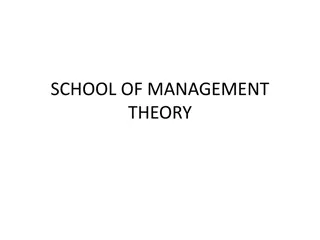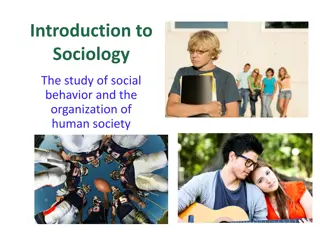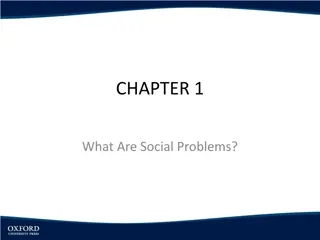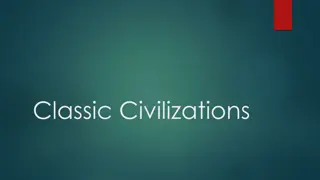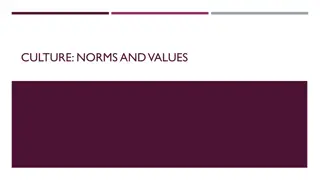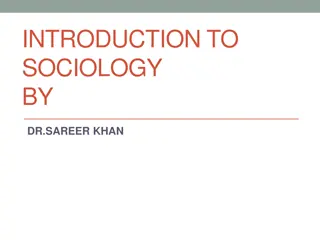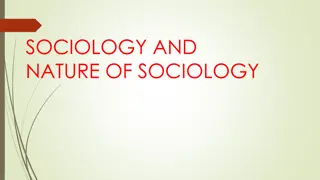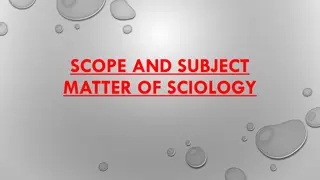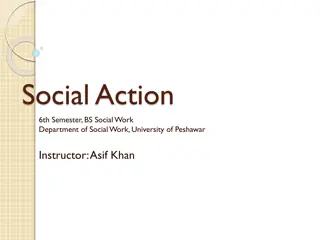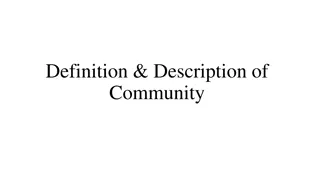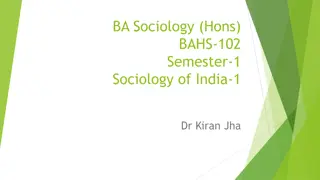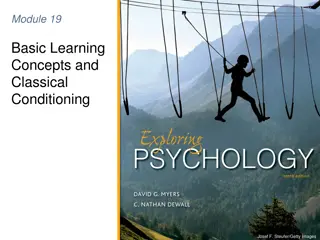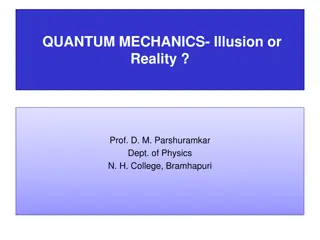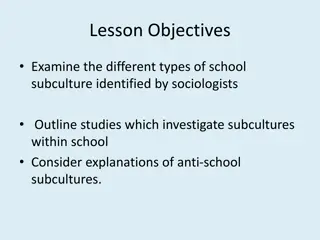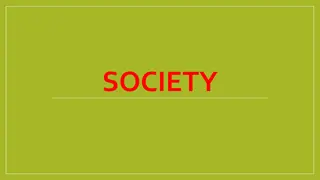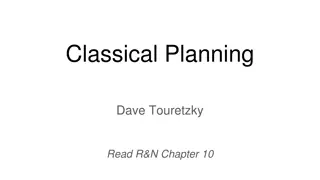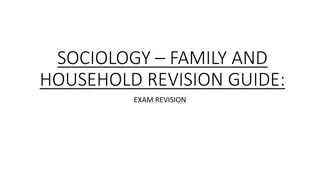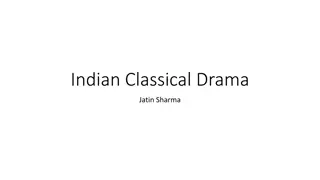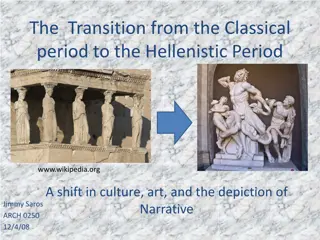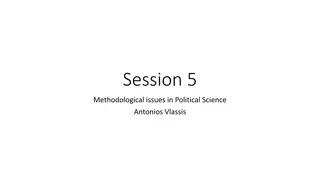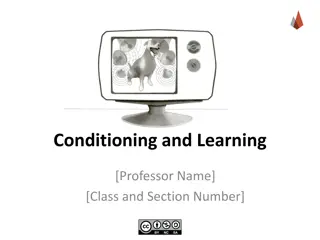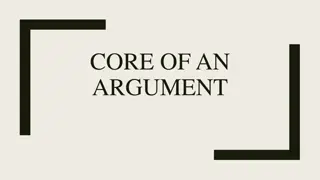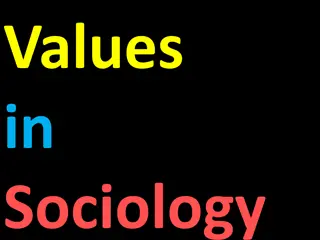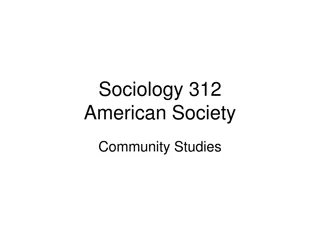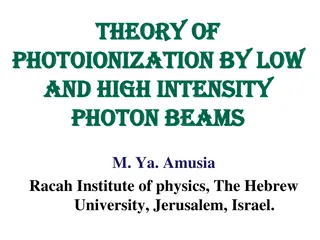Evolution of Management Theories: Classical Approach and Scientific Management
Explore the evolution of management theories focusing on the Classical Approach and Scientific Management. The Classical Approach emphasizes efficiency and specialization, while Scientific Management introduced systematic methods to increase productivity. Learn about key figures like Frederick Winsl
6 views • 31 slides
Insights into Energy Transition Research and Historical Perspectives
Explore the intersection of energy transition research with historical perspectives, focusing on the importance of just transitions and the evolving relationship between history and sociology. The discussion delves into key concepts like distributive justice, the role of historians and sociologists,
9 views • 8 slides
Understanding Sociology: The Study of Social Behavior
Sociology is a broad discipline that examines human interactions, behaviors, and how they are influenced by social structures, categories, and institutions. Sociologists ask key questions to understand the connections between everyday life and societal forces. By analyzing relationships between indi
1 views • 32 slides
Understanding Social Problems: A Sociological Perspective
Social problems are conditions or behaviors that cause public concern and require collective action. Sociology, particularly in the study of social issues, aims to identify both objective elements like measurable harm and subjective elements like moral evaluations. These subjective beliefs can shape
0 views • 34 slides
Understanding Classical Civilizations: Timeline Analysis and Periodization
Explore the concept of periodization by creating a timeline of significant life events and categorizing them into distinct periods. Learn about classical civilizations, time periods, and the process of dividing history into eras. Dive into the Classical Age and its contributions to human development
1 views • 24 slides
Understanding Classical Mechanics: Variational Principle and Applications
Classical Mechanics explores the Variational Principle in the calculus of variations, offering a method to determine maximum values of quantities dependent on functions. This principle, rooted in the wave function, aids in finding parameter values such as expectation values independently of the coor
0 views • 16 slides
Diverse Music Traditions of India - Classical to Folk
Explore the rich musical heritage of India, encompassing classical Carnatic and Hindustani music, folk melodies, film songs, and pop music. Learn about the intricate nuances of Indian classical music, its historical evolution, and the variety of genres within the music landscape of the country.
0 views • 8 slides
Understanding Cultural Norms and Values
Sociologists define culture through norms, values, beliefs, and material objects. Norms are rules that govern behavior, with three basic types: folkways, mores, and laws. Folkways are customs without moral significance, mores are norms with moral importance, and laws are clearly defined and enforced
0 views • 15 slides
Understanding Culture in Sociology: Key Concepts and Definitions
Culture is the cornerstone of society, distinguishing humans from animals and shaping our social lives. Sociologists define culture as the shared values, practices, norms, and beliefs that govern our interactions and behaviors. This comprehensive guide explores the non-material aspects of culture, i
1 views • 30 slides
Understanding the Origins and Development of Sociology
Sociology, as the science of society, emerged in the 19th century in Europe due to factors like the Industrial Revolution and successes in physical sciences. Influential early sociologists like Auguste Comte and Herbert Spencer contributed to the foundational theories of sociology. Emile Durkheim fu
0 views • 11 slides
Understanding Sociological Theories and Frameworks
Sociological theories, encompassing micro and macro perspectives, provide a lens to interpret societal dynamics. Consensus theories like functionalism emphasize shared norms, while conflict theories such as Marxism highlight social inequalities. Social action theories like interactionism focus on in
3 views • 21 slides
Scope and Subject Matter of Sociology: An Overview
Sociology encompasses a wide range of studies, from individual interactions to global social processes. Sociologists have debated the scope and subject matter of sociology, dividing it into formal/specialistic sociology and synthetic/general sociology. Different scholars have proposed various approa
4 views • 20 slides
Elements of Social Action: Understanding Human Behavior in Society
Social action plays a vital role in analyzing human behavior within a society. Max Weber's concept emphasizes how actions influence and are influenced by others, holding subjective meanings. Talcott Parsons outlined five components: actor, objective, social situation, normative orientation, and ener
0 views • 9 slides
Understanding the Concept of Community: Definition, Description, and Elements
The concept of community, derived from the Latin word "Commune," signifies a group of people who share common modes of communication, language, habits, and more. Sociologists have various definitions, with common elements being locality, community sentiment, and a shared culture. Communities are cla
0 views • 8 slides
Historical Development of Sociology in India: Phases and Significance
The historical development of Sociology in India is explored through key phases from 1773 to 1950. The first phase, characterized by ethnographic research, laid the foundation for Sociology, Anthropology, and Indology. The second phase witnessed the growth of Sociology as a profession with empirical
2 views • 10 slides
Examples of Classical and Operant Conditioning
Robert receiving a ticket for driving under the influence illustrates operant conditioning with negative punishments, while Chris being afraid of dogs after being bitten showcases classical conditioning with stimulus generalization. Jacob's joy from smelling his date's cologne demonstrates classical
1 views • 9 slides
Understanding Basic Learning Concepts and Classical Conditioning
Acquiring new information and behaviors through experience is known as learning. One common way we learn is through associative learning, where we connect certain events together. This process can take the form of classical conditioning, where stimuli evoke automatic responses, or operant conditioni
1 views • 14 slides
Exploring Quantum Mechanics: Illusion or Reality?
Delve into the fascinating realm of quantum mechanics with Prof. D. M. Parshuramkar as he discusses the contrast between classical and quantum mechanics. Discover how classical mechanics fails to predict the behavior of electrons in atoms and molecules, leading to the development of quantum mechanic
0 views • 70 slides
Exploring Gender Disparities in Crime
Delve into the intricate relationship between crime and gender by examining key sociological concepts like social control, chivalry thesis, and gender socialization. Understand why men are more inclined towards drug use compared to women. Explore questions on historical crime trends and the increasi
0 views • 16 slides
Exploring School Subcultures and Their Impact
This information delves into the various types of school subcultures, including anti-school subcultures, and examines studies on subcultures within schools. It discusses the behaviors, attitudes, and statuses associated with different school subcultures and highlights the impact of these subcultures
4 views • 21 slides
Understanding Society: Key Concepts and Characteristics
Society, as defined by various sociologists such as Maclver and Wright, is a complex web of social relationships, norms, and structures. It is characterized by abstractness, mutual interaction, dynamic nature, social control mechanisms, likeness, differences, cooperation, conflict, and a continuous
5 views • 20 slides
Understanding Grounded Theory Research Design
Grounded theory research design is an inductive approach used to systematically develop theories based on data collected and analyzed. Developed by sociologists Glaser and Strauss, this methodology emphasizes staying close to the data throughout the analysis process. It involves systematic procedure
0 views • 20 slides
Understanding Classical Planning in Artificial Intelligence
Classical planning in AI involves problem-solving with defined states, actions, preconditions, and effects. This text explores the concept of planning, classical planning characteristics, and provides examples such as the rocket problem with optimal and suboptimal plans.
0 views • 38 slides
Role of Men and Women in Domestic Division of Labor
The domestic division of labor encompasses the roles of men and women in housework, with traditional views promoting segregated conjugal roles and newer perspectives suggesting symmetrical family dynamics. While functionalists like Parsons argue for distinct roles based on gender, feminists challeng
0 views • 70 slides
Understanding Sociological Perspectives
Sociologists employ three primary theoretical perspectives to explain how society influences young people and vice versa: the symbolic interactionist perspective, the functionalist perspective, and the conflict perspective. Symbolic interactionism focuses on symbols and face-to-face interactions, wh
1 views • 18 slides
Insights into Indian Classical Drama and Literature
Explore the rich tradition of Indian classical drama and literature, from its origins in Ujjain during the Gupta period to the classification of major and minor dramas. Learn about the components of a classical Sanskrit drama, such as the plot, characters, sentiments, acting, and more. Delve into th
1 views • 9 slides
Classical Conversations Plus Program Overview
Explore Classical Conversations Plus program partnership opportunities, including the SEU partnership for homeschool students in grades 11-12. Learn about the administrative team, benefits, courses, and the Classical Christian education background rooted in the Western tradition. Discover how parent
0 views • 11 slides
Transition from Classical to Hellenistic Period: Art and Narratives
The evolution from the Classical period to the Hellenistic period in Ancient Greece brought significant shifts in culture, art, and storytelling. Classical art focused on idealized human forms and naturalistic poses, while Hellenistic art embraced more dramatic expressions and emotions. The narrativ
0 views • 23 slides
Understanding Vacuum Fluctuations in Quantum and Classical Physics
Explore the intriguing concept of vacuum fluctuations in both classical and quantum physics, delving into their experimental effects and significance. From classical interpretations of empty space to quantum field theory's zero-point fluctuations, discover how vacuum properties influence particle in
0 views • 38 slides
Quantum vs. Classical Computing: Exploring Forrelation Problem
Delve into the world of quantum and classical computing with the Forrelation problem that optimally separates the two realms. From Fourier correlations to quantum algorithms and classical lower bounds, explore the intricacies of distinguishing between quantum and classical computation through variou
0 views • 29 slides
The Logical Structure of Classical and Quantum Mechanics
The paper explores the common logical structure shared between classical and quantum mechanics, emphasizing the non-distributive lattice embedded in a distributive one. It discusses how all physical theories must adhere to this structure, incorporating topology, Heyting algebra, Boolean algebra, and
1 views • 36 slides
Basics of Learning: Classical and Operant Conditioning Overview
Types of learning include classical conditioning, operant conditioning, and observational learning. Classical conditioning involves pairing a neutral stimulus with a meaningful one to elicit a response. Operant conditioning focuses on how consequences influence behavior. Terminology like UCS, UCR, N
0 views • 66 slides
Understanding Classical Marxism: Key Concepts and Critiques
Marxism, rooted in the ideas of Karl Marx, emphasizes the significance of economic relations in shaping social and political structures. Classical Marxism focuses on economism, determinism, materialism, and structuralism, viewing history through a lens of class struggle and offering an emancipatory
0 views • 21 slides
Exploring Classical Mechanics in Physics
Delve into classical mechanics with topics ranging from helicopter dynamics and bicycle dynamics to inclined planes and the principles of Newton's laws of motion. Learn about the unique characteristics of instruments like the pianoforte and the foundational principles governing linear and angular mo
0 views • 14 slides
Understanding Classical Conditioning: Pavlov's Experiment and Responses
Explore the principles of classical conditioning through Pavlov's experiment, including the types of responses like conditioned emotional reactions. Learn about the components of classical conditioning such as unconditioned stimulus and response, conditioned stimulus and response, and how the proces
0 views • 42 slides
Crafting a Persuasive Classical Argument
Crafting a persuasive classical argument involves following a structured approach that includes grabbing the reader's attention in the introduction, presenting the writer's position with reasons and evidence, summarizing and critiquing alternative views, and concluding with a strong final impression
0 views • 30 slides
Understanding Conservation Principles in Fluid Dynamics and Classical Mechanics
Conservation principles play a significant role in fluid dynamics and classical mechanics. In fluid dynamics, conservation of mass, momentum, and energy are crucial for understanding fluid behavior. Classical mechanics, on the other hand, relies on Newton's laws to describe motion and energy conserv
0 views • 46 slides
Exploring Values in Sociology: A Critical Analysis of Objectivity and Subjectivity
Delve into the complex interplay between objectivity and subjectivity in sociology, examining whether true value-free research is achievable. Classical sociologists like Comte, Durkheim, and Marx are scrutinized for their perspectives on the role of values in sociological inquiry, challenging the no
0 views • 17 slides
Understanding Community Studies in American Sociology
Community studies in American sociology focus on analyzing life within specific neighborhoods, dating back to the 1920s. This field employs various research methods to explore social aspects extensively, building on anthropological urban ethnography. Early studies by influential figures like W.E.B.
0 views • 65 slides
Evolution of Photoionization Studies: From Classical Predictions to Quantum Triumph
Tracing the journey of photoionization studies from classical predictions to experimental rejections, quantum interpretations by Einstein, and current understanding through a classical approach. Highlighting key experiments, laws of photoeffect, and limitations faced in describing strong field situa
0 views • 47 slides
